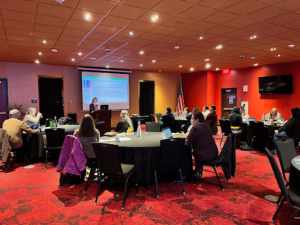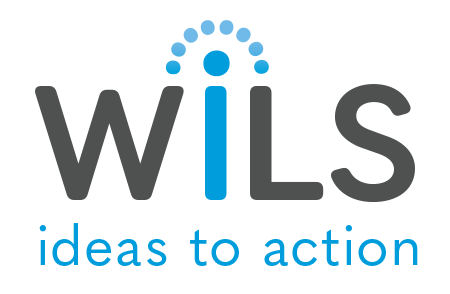by Kelsie Flack, Curating Indigenous Digital Collections Fellow, WiLS

WiLS and the Stockbridge-Munsee Community hosted a POWRR Professional Development Institute in Bowler this past November. The POWRR model focuses on “Preserving (Digital) Objects with Restricted Resources,” and the workshop discussed how cultural heritage professionals can ethically and safely preserve digital objects for access and use, based on the needs of specific communities and materials. We would like to extend a special thank you to Monique Tyndall, Director of Cultural Affairs for the Stockbridge-Munsee Community, and Bonney Hartley, Tribal Historic Preservation Manager, for providing us with cultural knowledge and connections to the Stockbridge-Munsee Band of Mohicans. We would also like to thank the staff at the Northstar Mohican Casino and Resort for their hospitality and incredible attention during our workshop.
Our group gathered at the Northstar Mohican Casino and Resort (Bowler, WI) to discuss the unique and special needs that Tribal institutions have in protecting, preserving, and safeguarding Tribal histories, materials, and knowledge. The workshop was led by Danielle Spalenka, Jaime Schumacher, and Stefan Elnabli from the POWRR team. They led us through presentations on the concepts of digital preservation and how to approach it based on our needs; cohort conversations touching on what our institutions have established for digital preservation and how we aim to grow those initiatives; and general discussions on preservation policy and strategy, digital vulnerabilities and technological risks, and preservation storage.

Several of Wisconsin’s Tribal communities were represented at the workshop and it was most beneficial to discuss the common themes that thread through the work of maintaining and preserving digital heritage from Native American sources. Our discussions touched on data sovereignty within Tribal institutions, how to best collaborate across multiple departments with varying needs, how to establish workflows and checklists within the digital preservation process, and how to choose and use digital databases and programs to best suit our institutional needs. We had members and professionals from the Ho-Chunk Nation, the Oneida Nation, the Bad River Band of Lake Superior Chippewa, the Menominee Tribe, and the Stockbridge-Munsee Community, and we were all able to come together and learn from each other. Our group collectively agreed to keep the conversation going through collaboration and communication regarding digital preservation and the myriad of tasks that come along with it. Individual attendees expressed their enthusiasm to work together and with WiLS to move forward in sharing ideas, practices, and procedures surrounding the tasks of digital preservation and curation.
One of the larger facets of digital preservation work is digital stewardship, which is the ongoing process of creating, managing, preserving, and sharing digital collections. The main goal of digital collections stewardship is to responsibly care for digital collections throughout their lifecycle and appropriately share said digital collections with varying communities. WiLS and the Stockbridge-Munsee Community have been working on digital collections stewardship through the second-year partnership of the Curating Indigenous Digital Collections project, which is funded by the National Endowment for the Humanities (NEH).
